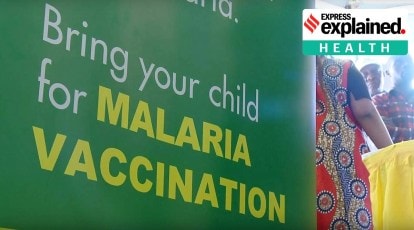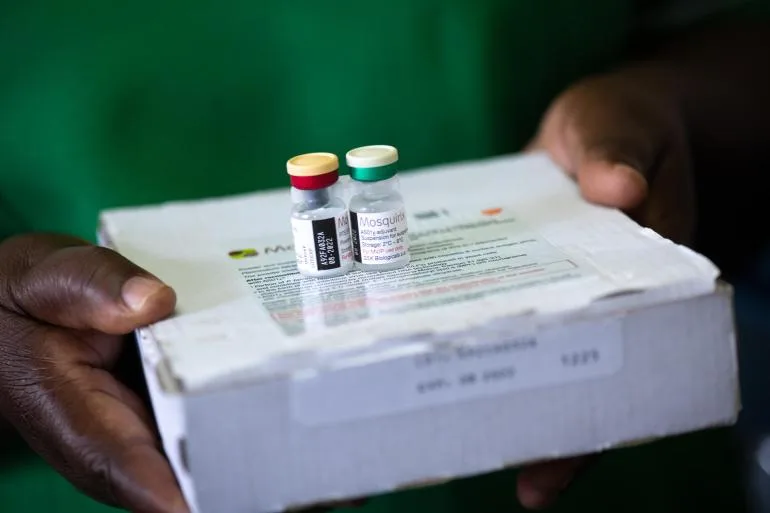Malaria vaccination start in African countries
More than 330 000 doses of WHO-recommended RTS,S malaria vaccine arrived last night in Cameroon – a historic step towards broader vaccination against one of the deadliest diseases for African children
- Malaria burden is the highest on the African continent, which accounted for approximately 95% of global malaria cases and 96% of related deaths in 2021
- With several African countries now finalizing roll-out plans, an additional 1.7 million doses are set for delivery to Burkina Faso, Liberia, Niger and Sierra Leone in the coming weeks
- These shipments signal that malaria vaccination is moving out of its pilot phase, and lay the groundwork for countries to begin vaccinations through Gavi-supported routine immunization programmes in Q1 2024.

Shipments of the world’s first WHO-recommended malaria vaccine, RTS,S, have begun with 331 200 doses landing last night in Yaoundé, Cameroon. The delivery is the first to a country not previously involved in the malaria vaccine pilot programme and signals that scale-up of vaccination against malaria across the highest-risk areas on the African continent will begin shortly.
In 2021, there were 247 million malaria cases globally, which led to 619 000 deaths. Of these deaths, 77 per cent were children under 5 years of age, mostly in Africa.
A further 1.7 million doses of the RTS,S vaccine are expected to arrive in Burkina Faso, Liberia, Niger and Sierra Leone in the coming weeks, with additional African countries set to receive doses in the months ahead.
Since 2019, Ghana, Kenya, and Malawi have been administering the vaccine in a schedule of 4 doses from around 5 months of age in selected districts as part of the pilot programme, known as the Malaria Vaccine Implementation Programme (MVIP).
The data from the pilot have shown the impact and safety of the RTS,S vaccine and provided important evidence on vaccine acceptability and uptake that helped inform the recent WHO recommendation of a second malaria vaccine – R21, manufactured by the Serum Institute of India (SII). Results of a phase 3 trial for R21 showed that the vaccine has a good safety profile in the clinical trial setting and reduces malaria in children. It is expected that, like RTS,S, when R21 is implemented it will have similar high public health impact. The choice of which vaccine to be used in a country should be based on programmatic characteristics, vaccine supply, and affordability.
R21 vaccine
The R21 vaccine is currently under review by WHO for prequalification. The availability of two malaria vaccines is expected to increase supply to meet the high demand from African countries and result in sufficient vaccine doses to benefit all children living in areas where malaria is a public health risk. In preparation for scaled-up vaccination, Gavi, WHO, UNICEF and partners are working with countries that have expressed interest and/or have confirmed rollout plans on the next steps.
About Gavi, the Vaccine Alliance
Gavi, the Vaccine Alliance is a public-private partnership that helps vaccinate more than half the world’s children against some of the world’s deadliest diseases. The Vaccine Alliance brings together developing country and donor governments, the World Health Organization, UNICEF, the World Bank, the vaccine industry, technical agencies, civil society, the Bill & Melinda Gates Foundation and other private sector partners.
Since its inception in 2000, Gavi has helped to immunise a whole generation – over 1 billion children – and prevented more than 17.3 million future deaths, helping to halve child mortality in 78 lower-income countries.
Gavi also plays a key role in improving global health security by supporting health systems and outbreak response as well as funding global stockpiles for Ebola, cholera, meningococcal and yellow fever vaccines.
After two decades of progress, Gavi is now focused on protecting the next generation, above all the zero-dose children who have not received even a single vaccine shot. The Vaccine Alliance employs innovative finance and the latest technology – from drones to biometrics – to save lives, prevent outbreaks before they can spread and help countries on the road to self-sufficiency.
About UNICEF
UNICEF works in some of the world’s toughest places, to reach the world’s most disadvantaged children. Across 190 countries and territories, we work for every child, everywhere, to build a better world for everyone.
